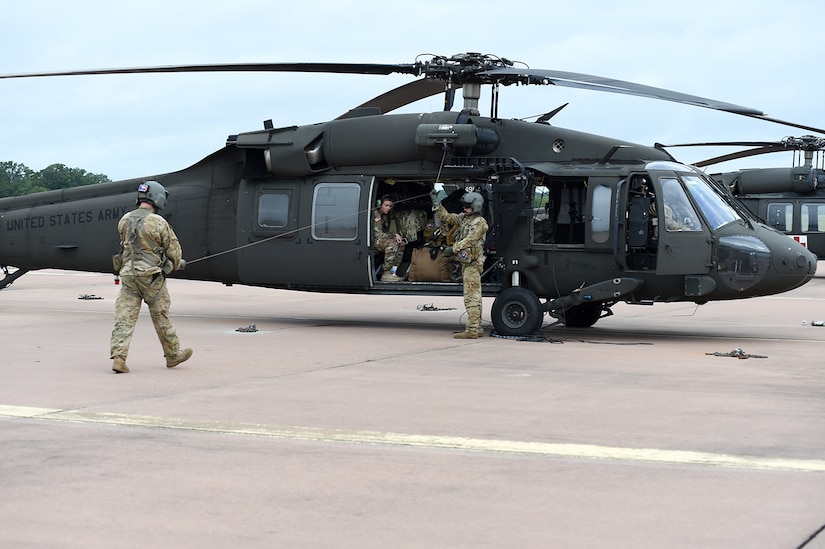By Army Sgt. Brian Schroeder, Oklahoma Army National Guard
LEXINGTON, Okla. -- Soldiers from the Oklahoma Army National
Guard departed yesterday from Muldrow Army Heliport here to provide
search-and-recovery capabilities for East Coast citizens impacted by Hurricane
Florence.
Seven soldiers from Detachment 1, Charlie Company, 1st
General Support Aviation Battalion, 169th Aviation Regiment, who trained in helicopter
search-and-rescue operations, are tasked to assist in Hurricane Florence relief
efforts. The unit flew to Knoxville, Tennessee, and is waiting on standby until
called upon by one of the states affected by the storm.
Once in Knoxville, the Oklahoma Army National Guard team of
aviators, crew chiefs and an operations sergeant, will fly to and link up with
Oklahoma’s Task Force 1, which includes a collaboration of Oklahoma City and
Tulsa firefighter-paramedics. The unified team of aviators and firefighters
regularly train together to conduct swift water rescue using dynamic and static
hoists.
Rescuing Stranded Citizens
Army Chief Warrant Officer 2 John Jenkins, a UH-60 Black
Hawk helicopter pilot assigned to Charlie Company, said the training for swift
water rescues and hoists with the Task Force 1 has prepared the group to
perform the potentially dangerous task of rescuing a person stranded after the
hurricane subsides.
Jenkins said he and his crew are excited to provide a
helping hand to citizens outside of Oklahoma.
“We all fall under the same flag, no matter which of the 50
states,” Jenkins said. “That’s part of putting the uniform on and doing the
job. It’s not the aspect of position, rank or title. It’s about going out there
and actually saving someone’s life.”
The pilots, working with crew chiefs and firefighters, will
locate and hover over stranded persons in need. The crew chief will then attach
the firefighter to the hoist. Once safety checks are complete, the firefighter
is lowered down to the stranded individual in a basket, seat or other floating
rescue device. The rescue team member will then make contact with the stranded
individual, secure the person to the hoist seat and both are lifted to the
cabin of the helicopter.
Depending on the number of remaining seats, Jenkins said the
team will continue collecting stranded individuals, drop them at an established
drop-off point, or fly the injured to an emergency facility for treatment.
“Individuals who are trapped or stuck and are exceeding the
means of a normal boat rescue, they call us to help assist,” Jenkins said. “I’m
looking forward to going out and taking care of the mission and making a
change, not only in someone else’s life, but also going out and reaching our
hand out to South Carolina, North Carolina and Virginia, showing that Oklahoma
is a helping state. We’ve always been that way.”
The crew’s mission also includes operational support on the
ground provided by Army Sgt. Tiffani McBride, an aviation operations sergeant
with Charlie Company. McBride’s primary role is to relay weather reports to the
flight crew, track the number of rescues and the crew’s flight hours to report
back to her home station.
“The key thing to take forward is just to be flexible,”
McBride said. “Everything can change in a matter of minutes. You’ve got to go
with the flow, but it’s all about helping people. I’m looking forward to it.”









No comments:
Post a Comment